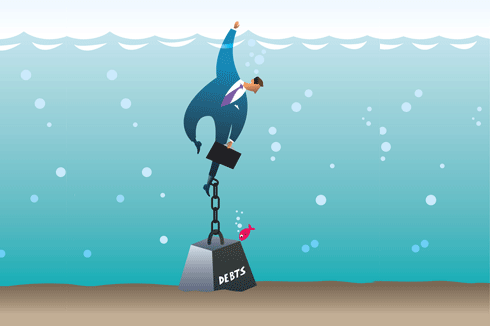Live Debt Free In Eight Baby Steps
 If you want to stop relying on lenders and creditors to get you through the month, then it’s time to learn about debt free living. Follow these eight steps to live debt free. Many of the steps are small and can make a big difference.
If you want to stop relying on lenders and creditors to get you through the month, then it’s time to learn about debt free living. Follow these eight steps to live debt free. Many of the steps are small and can make a big difference.
1. Create a budget and stick to it.
Financial experts recommend that you spend a certain percentage of your monthly income on the necessities, leaving the remainder for savings and incidentals. Reserve 35% of your budget for housing, 15% for transportation, and 15% for food.
2. Pay more than the minimum on your credit cards.
If you only pay the minimum on your credit card debt, you might only be covering the interest. Pay more than the minimum to achieve debt free living.
3. Check your credit report.
The last thing you want is to have your credit ruined because of a forgotten debt or because of identity theft. Take a peek at your credit report every 12 months to make sure all things are in order.
4. If you want something, save money for it.
Need new siding on the house? Want to take a trip to Paris? Wishing you could give all the kids their own iPads? Save money for the extras and pay for in full right away.
5. Look at all your debts and pay them in order of size.
List every debt you have in the order of size. Pay off the smallest debt first and work your way up.
6. Have a rainy day savings.
It’s recommended that you have 9-12 months of income in a savings account just in case. If you are often tempted to dip into that rainy day account, move the funds to an interest bearing account at a different bank where you do not have a checking account or debit card.
7. Call and ask for lower interest rates and payment plans.
Many lenders and creditors will lower your interest rate or create or adjust a payment plan, but you have to call and ask. You may also have to prove your facing financial hardship.
8. Ask for help.
Along with asking for lower interest rates and payment plans from creditors and lenders, ask a financial advisor to help you get on the path to debt-free living. Many professionals charge a fee for this service, but you might also find free help from organizations such as the Salvation Army. They will show you how best to handle your existing debt and give you advice on other money-saving tips such as health savings accounts, IRA contributions, and more.
This is a guest post by Allison Murray. Allison recommends finding more information about debt free living at Dialog.Scarborough.com.
















